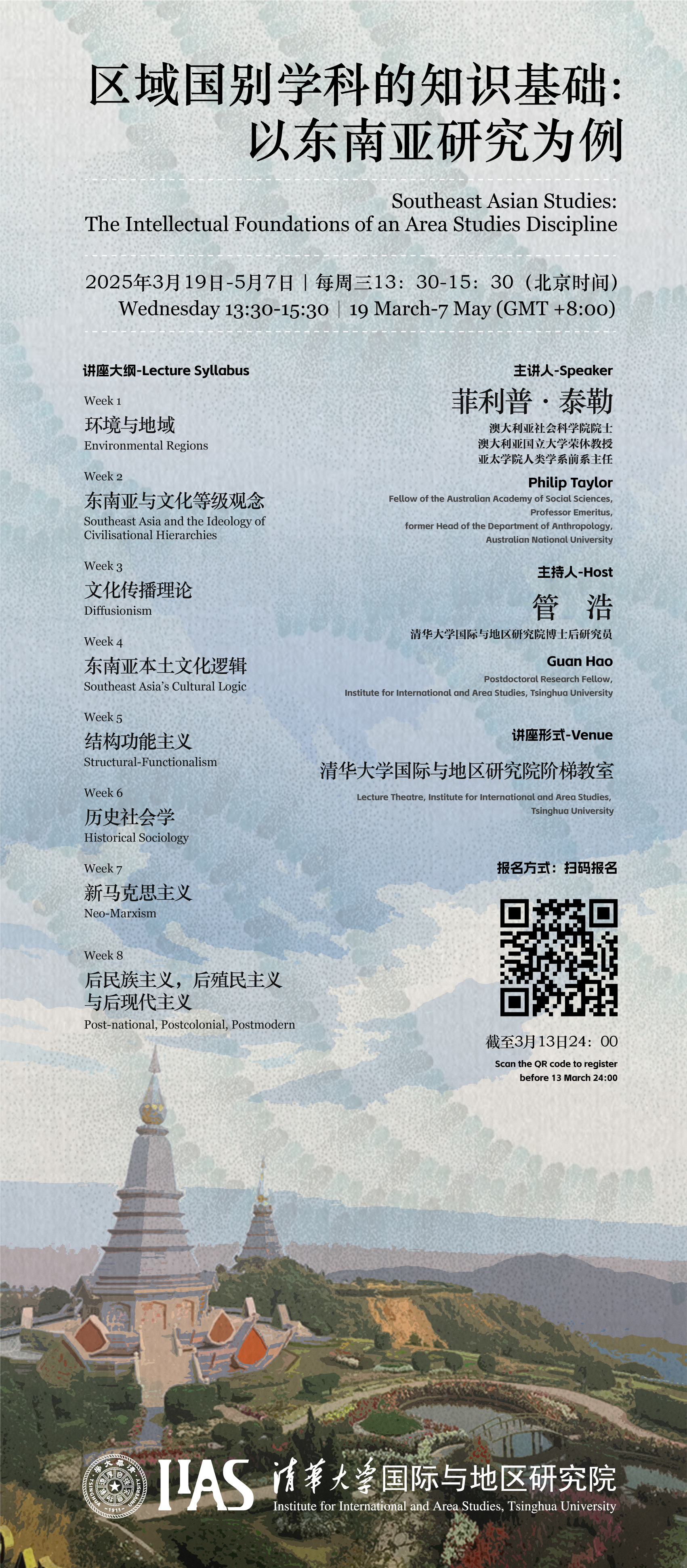
On the afternoon of March 26, 2025, the Institute for International and Area Studies of Tsinghua University invited Professor Philip Taylor, a member of the Australian Academy of Social Sciences, Emeritus Professor of the Australian National University, and former Head of the Department of Anthropology of the Asia-Pacific Institute, to give the second talk on “Southeast Asia and the Ideology of Civilisational Hierarchies” of the lecture series on “Southeast Asian Studies: The Intellectual Foundations of an Area Studies Discipline”. The lecture was hosted by Guan Hao, a post-doctoral researcher in IIAS. Dozens of students and faculty members from domestic and foreign universities as well as professionals who are interested in the topic attended, both offline and online.
Prof. Taylor began by reviewing the core ideas of Environmental Regions from the last lecture and summarising its implications for research in Southeast Asia. He pointed out that since the 19th century, Western academics have been gradually focusing on the ideology of civilisational hierarchies, i.e. the hierarchy of social development through a linear time scale. Influenced by Enlightenment Thought and Evolutionary Theory, this theory has been widely used to explain the developmental trajectory of ethnic groups in Southeast Asia and has become an important ideological basis for colonial governance. He then analysed the contributions of thinkers such as Kant, Hegel and Marx, and explored how the colonial era used the ideology of civilisational hierarchies to shape the social order in Southeast Asia. Prof. Taylor pointed out that the theory, while emphasising social progress, implied a theory of cultural superiority, which was used to legitimise Western colonial rule during the colonial period.
Finally, in the interactive discussion session, Prof. Taylor and the students had a lively discussion on whether civilisational progress is inevitable and whether different cultures share the same development approach.
Philip Taylor, PhD in Anthropology and Southeast Asian Studies, Fellow of the Australian Academy of Social Sciences, Professor Emeritus at the Australian National University, and former Head of the Department of Anthropology at the Asia Pacific Institute. He has lived and worked in Vietnam and Cambodia for over a decade, and has a command of Vietnamese, Cambodian and French. His research interests include contemporary anthropology of Vietnam, Mekong sub-regional studies, Southeast and East Asian studies, development and urbanization, and modernity.Representative works include monographs The Khmer Lands of Vietnam: Environment, Cosmology and Sovereignty (2014, Winner of the EuroSEAS-Nikkei Asian Review Social Science Book Award), Goddess on the Rise: Pilgrimage and Popular Religion in Vietnam(2004), Fragments of the Present: Searching for Modernity in Vietnam's South(2001)et al. Professor Taylor has supervised more than 30 PhD theses during his tenure at the Australian National University and has been awarded the ANU ‘top supervisor’ award. He has served as Editor-in-Chief of the Asia-Pacific Journal of Anthropology, Editor-in-Chief of the Vietnam Series of the Australian National University Press, and as a member of the Editorial Board of the Journal of Vietnamese Studies, the Review of Asian Studies, and the Cambridge History of the Vietnam War (Volume 3).




